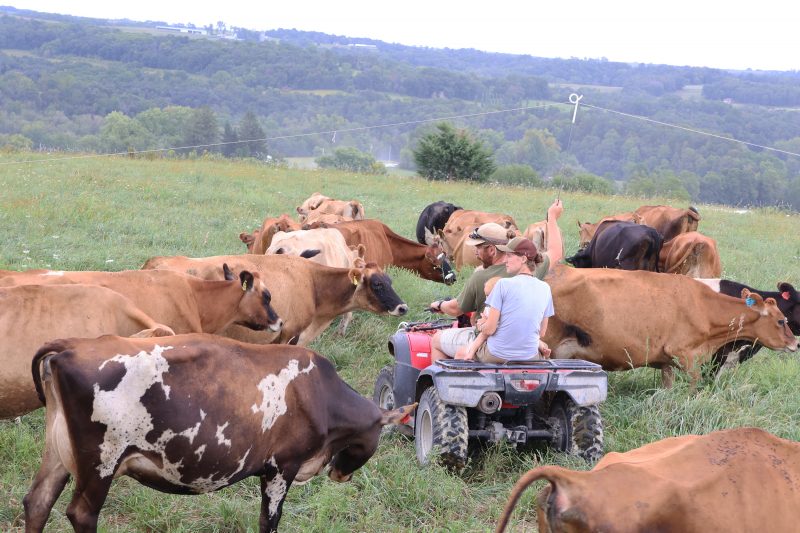Note: This is the 3rd installment in the 12-part “A Sense of Where You Are” series.
History is a critical piece of context. All too often, farming practices are carried out without taking into consideration past practices and their subsequent impact. Regenerative farmers often say they are “listening to the land” when making management decisions. Chemicals, iron, and oil can muffle what the land’s saying, but only temporarily. And the results of such a disconnect can be disastrous: both in terms of keeping the operation financially and ecologically sustainable, as well as when it comes to maintaining a farming future generations want to be involved in.

During an Iowa Organic Association field day in late August, brothers Parker and Sam Beard made it clear that they are quite aware of the historical context of their family’s farm, which is tucked away amongst the picturesque hills near Decorah, in northeastern Iowa. At the beginning of the field day, the brothers took field day participants to a ridge overlooking the farm’s milking parlor. While people watched, Sam and his wife, Jen, moved the dairy herd to a new grazing paddock — the land was covered in a dense stand of grasses and forbs, which were doing well despite a recent spate of droughty weather. But there is some erosive history here. It turns out long before the brother’s parents, Dan and Bonnie Beard, bought this farm, it had been plowed and row-cropped.
“At one point it had to be farmed in 17 different pieces because of the gullies,” said Parker.
That history was one reason the elder Beards adopted pasture-based dairy production soon after moving onto the land in the 1980s. In 2003, they transitioned to certified organic. In 2017, the Beards entered the grass-milk market, which means they receive another price boost on top of their organic premium for feeding their cows a 100% forage-based diet.
These days, Canoe Creek Dairy is being managed by a new generation of graziers — Parker, 30, and Sam, 32, have transitioned into the operation. Parker, along with his wife Esther, focus on the dairy end of the operation, while Sam and Jen produce beef.
Spend any time with the Beards and it’s clear that the family has not only made farming a viable option for the next generation — all four of the Beard children are involved in farming — from an economic and agronomic point of view, but from a quality of life standpoint as well.
“It’s always something we did as a family,” said Sam of producing livestock on grass. “There’s the joy of doing it together and getting to share the responsibilities and victories and difficulties.”
During the tour of Canoe Creek’s hilly pastures, it was evident that the brothers are more committed than ever to their family’s legacy of perennial plant-based livestock production. But that doesn’t mean they aren’t willing to add their own twists to the system. For example, instead of weaning calves soon after they are born, the Beards now utilize a smaller herd of nurse cows, also called nanny cows, to feed the young stock. This not only saves the labor of hauling milk buckets to calves while keeping them healthy, it also provides a way to make use of parts of the farm that would be difficult to graze the main milking herd on.
And now that the brothers are having children of their own, new generational depth is being sunk into the soil: these days, their young daughters play at “making fence” using beat-up wire spools.
“They say, ‘We’re going fencing, papa,’ ” said Parker with a smile. “I think grazing is in our blood, and this farm’s blood too.”
Brian DeVore edits the Land Stewardship Letter and produces the Ear to the Ground podcast.
Give it a Listen
- Ear to the Ground 349: Family, Farming & Forages (Parker & Sam Beard)
Installments in the ‘A Sense of Where You Are’ Series:
- Introduction to the Series: A Sense of Where You Are
- Red Dresses & Magic Management
- In the Blood
- Seeking Signs of Life
- Forest for the Trees
- The Quickening
- Food Bank Booster
- First Things First
- The Big Picture
- The Snowball Effect
- 7 Years Later
- Against the Grain